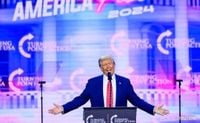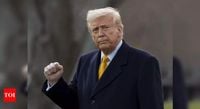In a surprising turn of events, U.S. President Donald Trump recently expressed eagerness about the prospect of facing former President Barack Obama in a hypothetical election scenario. During a discussion in the Oval Office on April 1, 2025, Trump stated, "I'd love that. That would be a good one. I'd like that." This comment came amid growing speculation about Trump's political future, particularly regarding the possibility of running for a third term in office, a notion he has been vocal about in recent interviews.
In an interview with NBC News, Trump emphasized that he is "not joking" about the idea of a third term and hinted at potential "methods" that could allow it to happen, despite the constitutional barriers. The 22nd Amendment to the U.S. Constitution, ratified in 1951, restricts presidents to serving no more than two terms. This amendment was enacted after Franklin Delano Roosevelt (FDR) became the only U.S. president to serve more than two terms, a situation that arose following his election victories in 1932, 1936, 1940, and 1944. FDR's unprecedented four-term presidency ended with his death on April 12, 1945, during his fourth term, leading to Vice President Harry Truman assuming the presidency.
Trump's comments have reignited discussions surrounding presidential term limits, although any serious attempt to amend the Constitution would likely provoke significant political turmoil. Most constitutional scholars agree that the 22nd Amendment makes a third term for any president highly unlikely. Nevertheless, Trump has continued to entertain the idea, stating, "A lot of people want me to do it," and asserting that he has nearly four years left in his current term, focusing on fulfilling his responsibilities.
Interestingly, Trump is only the second president in U.S. history to win a nonconsecutive term, having won the presidency in 2016, lost in 2020, and won again in 2024. The first to achieve this was Grover Cleveland, who served two nonconsecutive terms from 1885 to 1889 and 1893 to 1897. Trump's unique position has led to speculation about his future political ambitions, especially as he navigates the complexities of the 22nd Amendment.
In January 2025, Republican lawmaker Andy Ogles of Tennessee introduced a resolution in the House that would allow a president who has served nonconsecutive terms to run for a third term. However, this proposal faces significant hurdles, as it would require a constitutional amendment, a process that is often fraught with challenges and political disagreements. The 12th Amendment also complicates matters, stating that no person constitutionally ineligible for the presidency may serve as vice president, which could affect any potential strategy involving a vice-presidential candidacy.
Despite the apparent difficulties, Trump's remarks have not gone unnoticed in the betting world. According to offshore bookmaker BetOnline.ag, the odds of Trump securing a third term have improved from 10 to one to six to one, positioning him as a strong contender behind current Vice President JD Vance for the 2028 presidential race.
As discussions about Trump's potential third term unfold, it is crucial to remember the historical context of presidential term limits. The 22nd Amendment was passed in 1947 and ratified in 1951, largely in response to FDR's four-term presidency, which many felt set a dangerous precedent. The amendment states, "No person shall be elected to the office of the President more than twice," and also bars anyone who has served more than two years of a term to which another person was elected from being elected again more than once.
Trump's musings about a third term are not entirely new; he has speculated about this possibility throughout his presidency. However, his recent comments mark a notable shift in tone, suggesting a more serious consideration of the idea. During his discussions, he mentioned various scenarios, including one where Vice President JD Vance could run for president in 2028 and then "pass the baton" to Trump as his running mate. However, the legal viability of such a plan remains highly questionable.
As Trump approaches the end of his second term in January 2029, he will be 82 years and seven months old, making him the oldest president in U.S. history, surpassing Democrat Joe Biden, who was 82 years and two months old when he left office in January. This age factor adds another layer of complexity to the discussions surrounding Trump's potential candidacy.
While Trump continues to express enthusiasm for the idea of a third term, the constitutional barriers and historical precedents make such a scenario highly improbable. Yet, the political landscape is ever-changing, and Trump's ability to capture public interest and support remains strong. As the nation gears up for the 2028 presidential election, all eyes will be on Trump and how he navigates the intricate web of U.S. electoral politics.





